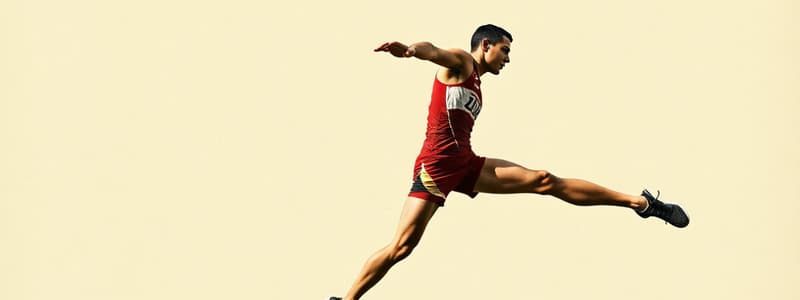Podcast
Questions and Answers
What is the primary focus of the lesson regarding workout design?
What is the primary focus of the lesson regarding workout design?
To design a quality, safe workout tailored to a specific athlete or client's goals and abilities.
What type of injuries should trainers be mindful of when designing workouts?
What type of injuries should trainers be mindful of when designing workouts?
Injuries such as knee injuries, muscle and tendon strains, and core conditions.
What role do the menisci play in the knee joint?
What role do the menisci play in the knee joint?
They act as shock absorbers, providing cushioning and stability for the knee.
What should be avoided when designing a workout for someone with a meniscus tear?
What should be avoided when designing a workout for someone with a meniscus tear?
What are the three ligaments mentioned that stabilize the knee?
What are the three ligaments mentioned that stabilize the knee?
What is a key consideration when leading a workout for a client with injuries?
What is a key consideration when leading a workout for a client with injuries?
What can cause injuries to the ACL, MCL, and LCL?
What can cause injuries to the ACL, MCL, and LCL?
Why is it important for trainers to consult medical practitioners?
Why is it important for trainers to consult medical practitioners?
What types of activities increase stress on the knee and may aggravate tears?
What types of activities increase stress on the knee and may aggravate tears?
What low-impact exercises are recommended for knee health?
What low-impact exercises are recommended for knee health?
Why is training important for individuals with muscular degeneration?
Why is training important for individuals with muscular degeneration?
What are degenerative conditions, and how do they affect the body?
What are degenerative conditions, and how do they affect the body?
Name a degenerative condition that affects the joints and describe it.
Name a degenerative condition that affects the joints and describe it.
What are some benefits of resistance exercises and gentle stretching?
What are some benefits of resistance exercises and gentle stretching?
How does a strong core contribute to injury prevention?
How does a strong core contribute to injury prevention?
List two common causes of overuse injuries.
List two common causes of overuse injuries.
List two types of training recommended for improving knee stability.
List two types of training recommended for improving knee stability.
What is the importance of gradual progression in physical activity?
What is the importance of gradual progression in physical activity?
What is tendinopathy, and how does it develop?
What is tendinopathy, and how does it develop?
What are strains and where are they commonly found?
What are strains and where are they commonly found?
Identify one key method to prevent muscle, tendon, or ligament tears.
Identify one key method to prevent muscle, tendon, or ligament tears.
What is a common cause of lower back pain?
What is a common cause of lower back pain?
What should be emphasized for the prevention of a herniated disk?
What should be emphasized for the prevention of a herniated disk?
What is rectus diastasis?
What is rectus diastasis?
Meniscus tears occur in the knee joint and are injuries to the cartilage.
Meniscus tears occur in the knee joint and are injuries to the cartilage.
The ACL stabilizes the knee by preventing the tibia from moving backward.
The ACL stabilizes the knee by preventing the tibia from moving backward.
High-impact activities should be avoided when designing a workout for someone with a meniscus tear.
High-impact activities should be avoided when designing a workout for someone with a meniscus tear.
The medial meniscus is located on the outer side of the knee joint.
The medial meniscus is located on the outer side of the knee joint.
Core and abdominal conditions are a concern when working with clients who have injuries.
Core and abdominal conditions are a concern when working with clients who have injuries.
MCL injuries are caused mainly by overuse during exercise.
MCL injuries are caused mainly by overuse during exercise.
Sudden twisting or rotation of the knee while bearing weight can increase stress and aggravate a tear.
Sudden twisting or rotation of the knee while bearing weight can increase stress and aggravate a tear.
Injuries like muscle and tendon strains should be carefully considered when designing a workout.
Injuries like muscle and tendon strains should be carefully considered when designing a workout.
Low-impact exercises like swimming or cycling are discouraged for individuals with knee issues.
Low-impact exercises like swimming or cycling are discouraged for individuals with knee issues.
The menisci function primarily as connectors for the knee ligaments.
The menisci function primarily as connectors for the knee ligaments.
Osteoarthritis is characterized by the gradual deterioration of the cartilage in the joints.
Osteoarthritis is characterized by the gradual deterioration of the cartilage in the joints.
Strength training has no impact on improving balance and coordination.
Strength training has no impact on improving balance and coordination.
Degenerative conditions worsen only in younger individuals.
Degenerative conditions worsen only in younger individuals.
Tendinopathy is a result of chronic degeneration of tendons due to aging or overuse.
Tendinopathy is a result of chronic degeneration of tendons due to aging or overuse.
Weight-bearing activities help stimulate bone formation in individuals with osteoporosis.
Weight-bearing activities help stimulate bone formation in individuals with osteoporosis.
Low bone density can increase the risk of fractures in individuals.
Low bone density can increase the risk of fractures in individuals.
Resistance exercises and gentle stretching can improve joint stability.
Resistance exercises and gentle stretching can improve joint stability.
Inadequate rest is not a common cause of overuse injuries.
Inadequate rest is not a common cause of overuse injuries.
Strains are injuries to ligaments caused by stretching or tearing.
Strains are injuries to ligaments caused by stretching or tearing.
Warming up properly can help prevent muscle and ligament tears.
Warming up properly can help prevent muscle and ligament tears.
Lower back pain can be caused by poor posture.
Lower back pain can be caused by poor posture.
A herniated disk is caused by sufficient core exercise.
A herniated disk is caused by sufficient core exercise.
Cross-training helps avoid repetitive stress and injuries.
Cross-training helps avoid repetitive stress and injuries.
Strengthening weak areas is unimportant for injury prevention.
Strengthening weak areas is unimportant for injury prevention.
Meniscus tears are injuries to the cartilage located in the shoulder joint.
Meniscus tears are injuries to the cartilage located in the shoulder joint.
Avoiding high-impact activities is recommended for someone with a meniscus tear.
Avoiding high-impact activities is recommended for someone with a meniscus tear.
MCL injuries are typically caused by sudden movements or direct blows.
MCL injuries are typically caused by sudden movements or direct blows.
Overuse injuries are commonly caused by inadequate rest during physical activity.
Overuse injuries are commonly caused by inadequate rest during physical activity.
The menisci act mainly as shock absorbers for the knee joint.
The menisci act mainly as shock absorbers for the knee joint.
All types of training are equally beneficial for athletes with injuries.
All types of training are equally beneficial for athletes with injuries.
Resistance exercises can help improve muscle strength and bone health.
Resistance exercises can help improve muscle strength and bone health.
Core strength is not important for preventing lower back pain.
Core strength is not important for preventing lower back pain.
Cross-training is beneficial in avoiding repetitive stress injuries.
Cross-training is beneficial in avoiding repetitive stress injuries.
Flexibility and mobility exercises are only important for advanced athletes.
Flexibility and mobility exercises are only important for advanced athletes.
A herniated disk is primarily caused by excessive strain or improper lifting.
A herniated disk is primarily caused by excessive strain or improper lifting.
Sudden twisting or rotation of the knee while bearing weight can decrease stress on the knee.
Sudden twisting or rotation of the knee while bearing weight can decrease stress on the knee.
Degenerative conditions can worsen over time due to aging or wear and tear.
Degenerative conditions can worsen over time due to aging or wear and tear.
Low-impact exercises like swimming or cycling are recommended for individuals with knee issues.
Low-impact exercises like swimming or cycling are recommended for individuals with knee issues.
Strength training has no benefits for improving balance and coordination.
Strength training has no benefits for improving balance and coordination.
Tendinopathy occurs due to chronic degeneration of tendons, which can result from overuse or aging.
Tendinopathy occurs due to chronic degeneration of tendons, which can result from overuse or aging.
Balance and stability training is unimportant for improving knee stability.
Balance and stability training is unimportant for improving knee stability.
Degenerative Disc Disease involves the breakdown of spinal discs leading to neck or back pain.
Degenerative Disc Disease involves the breakdown of spinal discs leading to neck or back pain.
Flashcards
Athletic Performance
Athletic Performance
The ability of an athlete to execute specific movements or skills effectively and efficiently.
Workout Design
Workout Design
Creating a tailored exercise plan for a specific person or athlete.
Knee Injuries
Knee Injuries
Common injuries to the knee joint, such as meniscus tears, ACL/MCL/LCL tears.
Meniscus Tears
Meniscus Tears
Signup and view all the flashcards
ACL/MCL/LCL Injuries
ACL/MCL/LCL Injuries
Signup and view all the flashcards
Degenerative Conditions
Degenerative Conditions
Signup and view all the flashcards
Overuse Injuries
Overuse Injuries
Signup and view all the flashcards
Workout Safety
Workout Safety
Signup and view all the flashcards
What are degenerative conditions?
What are degenerative conditions?
Signup and view all the flashcards
What's the impact of aging on degenerative conditions?
What's the impact of aging on degenerative conditions?
Signup and view all the flashcards
Osteoarthritis
Osteoarthritis
Signup and view all the flashcards
Degenerative Disc Disease (DDD)
Degenerative Disc Disease (DDD)
Signup and view all the flashcards
Osteoporosis
Osteoporosis
Signup and view all the flashcards
Tendinopathy
Tendinopathy
Signup and view all the flashcards
Why is weight bearing important for degenerative conditions?
Why is weight bearing important for degenerative conditions?
Signup and view all the flashcards
How does strength training benefit people with degenerative conditions?
How does strength training benefit people with degenerative conditions?
Signup and view all the flashcards
Resistance Exercises
Resistance Exercises
Signup and view all the flashcards
Gradual Progression
Gradual Progression
Signup and view all the flashcards
Strains
Strains
Signup and view all the flashcards
Sprains
Sprains
Signup and view all the flashcards
Lower Back Pain
Lower Back Pain
Signup and view all the flashcards
Herniated Disk
Herniated Disk
Signup and view all the flashcards
Rectus Diastasis
Rectus Diastasis
Signup and view all the flashcards
What are Meniscus Tears?
What are Meniscus Tears?
Signup and view all the flashcards
Muscle and Tendon Strains
Muscle and Tendon Strains
Signup and view all the flashcards
Core and Abdominal Conditions
Core and Abdominal Conditions
Signup and view all the flashcards
What to Avoid with Knee Injuries?
What to Avoid with Knee Injuries?
Signup and view all the flashcards
What is a Safe Workout for Knee Injuries?
What is a Safe Workout for Knee Injuries?
Signup and view all the flashcards
What are overuse injuries?
What are overuse injuries?
Signup and view all the flashcards
How to prevent overuse injuries
How to prevent overuse injuries
Signup and view all the flashcards
What is a strain?
What is a strain?
Signup and view all the flashcards
What is a sprain?
What is a sprain?
Signup and view all the flashcards
What is lower back pain?
What is lower back pain?
Signup and view all the flashcards
What is a herniated disc?
What is a herniated disc?
Signup and view all the flashcards
What is rectus diastasis?
What is rectus diastasis?
Signup and view all the flashcards
How to prevent lower back pain
How to prevent lower back pain
Signup and view all the flashcards
What are the benefits of strength training for degenerative conditions?
What are the benefits of strength training for degenerative conditions?
Signup and view all the flashcards
How does training help manage Degenerative Conditions?
How does training help manage Degenerative Conditions?
Signup and view all the flashcards
Proper Technique
Proper Technique
Signup and view all the flashcards
Workout Safety for Existing Injuries
Workout Safety for Existing Injuries
Signup and view all the flashcards
Weight-bearing Activities
Weight-bearing Activities
Signup and view all the flashcards
Strength Training
Strength Training
Signup and view all the flashcards
Low-Impact Cardio
Low-Impact Cardio
Signup and view all the flashcards
Study Notes
Athletic Performance Final Project
- Students will design quality, safe workouts tailored to specific athletes/clients.
- This project focuses on informing students on designing workouts for athletes/clients who have received medical clearance.
- The workouts should support the athletes' goals and abilities.
- Students will lead the entire class through the workout they design.
Lesson Objectives
- Students will design quality, safe workouts tailored to the needs of a specific athlete/client.
Where We Are Going
- Clients/athletes have varying backgrounds, abilities, and fitness goals.
- Many clients/athletes within the community have concerns/issues requiring movement-based solutions.
- Students will work in groups of 2-3 to design a tailored workout.
Important Considerations
- This lesson is not about rehabilitation; clients/athletes who require rehabilitation should consult a physiotherapist or physician.
- Trainers must consider the client's medical clearance and any related injuries.
Overview of Training Types
- Cardio
- Strength
- Flexibility
- Balance
- Coordination
Common Concerns/Conditions
- Knee injuries
- Degenerative conditions
- Overuse injuries
- Muscle and tendon strains
- Core and abdominal conditions
Meniscus Tears
- Meniscus tears are injuries to the crescent-shaped cartilage in the knee joint.
- Each knee has two menisci (medial and lateral).
- Menisci act as shock absorbers and provide cushioning/stability for the knee.
ACL/MCL/LCL Injuries
- ACL (Anterior Cruciate Ligament) prevents tibia sliding forward and controls rotation.
- MCL (Medial Collateral Ligament) stabilizes the inner knee and prevents inward bending.
- LCL (Lateral Collateral Ligament) stabilizes the outer knee and prevents outward bending.
- Injuries to these ligaments are often caused by sudden movements or direct blows.
Causes of Meniscus/LCL/ACL/MCL Injuries
- Sudden twisting or rotation of the knee (with weight bearing)
- Direct impact or trauma (particularly in contact sports)
- Age-related degenerative changes making cartilage more prone to tears
What to Avoid: High-Impact Activities
- Activities such as running, jumping, or twisting can aggravate knee injuries.
- Be mindful of lateral movements and resistance/depth during exercises.
- Consider low-impact alternatives (with medical approval).
What to Include in Training
- Low-Impact Cardio
- Strength Training
- Core Work (improves stability and alignment)
- Balance and Stability Training (examples: single leg exercises, Bosu balls)
Degenerative Conditions
- Chronic health disorders causing gradual deterioration of tissues, organs, etc.
- Conditions frequently worsen with age or due to wear and tear.
- Affect various body parts (joints, bones, muscles, nerves, organs).
Common Degenerative Conditions
- Osteoarthritis (OA)
- Degenerative Disc Disease (DDD)
- Osteoporosis
- Tendinopathy
Training for Muscular Degeneration
- Include weight-bearing activities to stimulate bone growth and slow bone loss (critical for osteoporosis management).
- Enhance balance and coordination through strengthening muscles to reduce fall risks and fractures.
- Increase strength and flexibility via resistance exercises and gentle stretching to improve joint stability and support bone health.
Overuse Injuries
- Common Causes:
- Repetitive movements
- Inadequate rest
- Improper technique
- Sudden increases in activity level
- Weakness or imbalances
Preventing Overuse Injuries
- Gradual progression of activity levels
- Proper technique during exercises/sports
- Cross-Training for variety to avoid repetitive stress
- Adequate rest and recovery
- Strengthening weak areas and maintaining flexibility.
Strains and Sprains
- Strains: Muscle/tendon injuries (overstretching or tearing). Example areas: Hamstrings, lower back, shoulder.
- Sprains: Ligament injuries (stretching or tearing). Example areas: Ankles, knees, wrists.
Muscle/Tendon/Ligament Overview
- Muscles: Source of body movement
- Tendons: Connect muscles to bones, enabling muscle-driven movements.
- Ligaments: Connect bones, offering stability to joints.
Preventing Muscle/Tendon/Ligament tears
- Warm-up thoroughly before each workout.
- Employ correct techniques during exercises/sports.
- Progress gradually in intensity and duration.
- Strength and stability training; also, flexibility and mobility.
- Use appropriate safety gear.
- Focus upon balance exercises.
Core and Abdominal Conditions
- Lower Back Pain
- Herniated Disk
- Rectus Diastasis
Causes (of Core & Abdominal Conditions)
- Lower Back Pain: Poor posture, weak core muscles, improper lifting techniques.
- Herniated Disc: Bulging/rupturing of spinal disk, often from excessive strain/improper lifting.
- Diastasis Recti: Separation of rectus abdominis muscles, often associated with postpregnancy.
Prevention of Core and Abdominal Conditions
- Lower Back Pain: Strengthen core, improve flexibility, correct lifting techniques.
- Herniated Disc: Engage in low-impact core workouts, avoid pressure-inducing spinal movements, and prioritize proper posture.
- Diastasis Recti: Implement focused core-strengthening exercises, such as pelvic tilts/modified planks, while steering clear from high-impact movements like sit-ups.
Studying That Suits You
Use AI to generate personalized quizzes and flashcards to suit your learning preferences.




